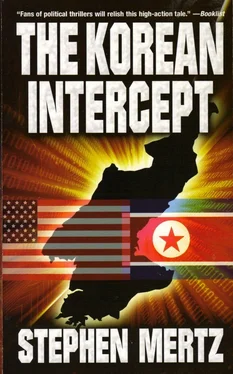Stephen Mertz - The Korean Intercept
Здесь есть возможность читать онлайн «Stephen Mertz - The Korean Intercept» весь текст электронной книги совершенно бесплатно (целиком полную версию без сокращений). В некоторых случаях можно слушать аудио, скачать через торрент в формате fb2 и присутствует краткое содержание. Жанр: Триллер, на английском языке. Описание произведения, (предисловие) а так же отзывы посетителей доступны на портале библиотеки ЛибКат.
- Название:The Korean Intercept
- Автор:
- Жанр:
- Год:неизвестен
- ISBN:нет данных
- Рейтинг книги:3 / 5. Голосов: 1
-
Избранное:Добавить в избранное
- Отзывы:
-
Ваша оценка:
- 60
- 1
- 2
- 3
- 4
- 5
The Korean Intercept: краткое содержание, описание и аннотация
Предлагаем к чтению аннотацию, описание, краткое содержание или предисловие (зависит от того, что написал сам автор книги «The Korean Intercept»). Если вы не нашли необходимую информацию о книге — напишите в комментариях, мы постараемся отыскать её.
The Korean Intercept — читать онлайн бесплатно полную книгу (весь текст) целиком
Ниже представлен текст книги, разбитый по страницам. Система сохранения места последней прочитанной страницы, позволяет с удобством читать онлайн бесплатно книгу «The Korean Intercept», без необходимости каждый раз заново искать на чём Вы остановились. Поставьте закладку, и сможете в любой момент перейти на страницу, на которой закончили чтение.
Интервал:
Закладка:
Twenty minutes later, they entered the earth's atmosphere. As the atmosphere grew denser, its resistance provided braking action for the spacecraft, generating incredible surface friction, heating the leading edges of the orbiter, turning the shuttle's underbelly a vivid orange. The thrusters lost their effectiveness and the rudder and the elevons began clutching the heavier air. The computers controlled the entire flight.
Scott and Kate did not speak until Scott could take no more of it. He thumped the armrest of his chair with a balled fist, his eyes glued to the digital altimeter as it ran backward.
"This is nuts. Totally, absolutely nuts. We're not even going to make it to Japan at this rate of descent; I don't care what navigation and radar say. Something is all wrong. According to the computers, we're already over Manchuria, for crying out loud."
Kate was closely following their descent trajectory on a computer screen. "Altitude twenty-two miles, nine minutes from touchdown."
"We're going down inside China or North Korea if we're lucky, the Sea of Japan if we're not so lucky," Scott said.
"The hell with orders." He activated the radio downlink. "Houston Control, this is Liberty. Come in, Houston. This is an emergency. I repeat: come in, Houston." The airwaves crackled with nothing but static. He tried hailing Mission Control three more times in rapid succession. Nothing. Then he told Kate, "We're going to full auto."
Her eyes remained steady on the indicator screens. "It doesn't make sense."
"Oh yes, it does. We've been snookered. Houston didn't abort this mission and reprogram the computers, and they didn't order us to Stealth."
"Then who did? What's going on?"
"What's going on is that someone faked that transmission. Someone is bringing us in."
Kate looked at the darkness outside. "Bringing us in? But that's incredible. Can it be done?"
Scott nodded, his expression grim. "It's being done. It's the only answer that makes any sense. All systems are consistent; they just seem to have a mind of their own. And with Stealth activated, Houston doesn't have us on their radar. No one does." He flicked control switches as he spoke. "Figures. No systems response whatsoever. We have no manual control."
"Altitude is forty-four thousand feet. Speed one thousand one hundred."
"That puts us on a descent rate of ten thousand feet per minute," Scott noted, his tone neutral with professional objectivity. "That's a glide slope seven times steeper than a commercial airliner, with no idea where we're touching down."
"But, Ron… with the Stealth activated-" She allowed the sentence to taper off.
"Right." He nodded. "Whoever's bringing us down can't pick us up on their radar, either. And that gives me an idea that might be the only chance we've got."
"Care to share it with me?"
He gave her a tight grin. "Whoever they are, they overrode the Houston program in our computers. But they can only bring us down so far. Then they'll have to give me back manual control at least for the landing. That gives us a very small window."
"To do what?"
"Let's find out."
Liberty covered seven miles, dropping 13,000 feet, during the next eighty seconds.
At 11,300 feet, traveling at a speed of 410 miles per hour, the middle systems screen indicated that the digital autopilot was disengaged, meaning that control of the shuttle was returned to the pilot. Gripping the hand controller, Scott commenced manually steering the vessel. The shuttle continued eating up its glide slope. He carefully moved the hand controller forward to put Liberty into its first of four necessary braking S-turn maneuvers.
Kate read out airspeed and altitude so that he could focus his attention on flying. "Speed three hundred ten. Altitude fourteen hundred."
Outside the windows, the reflection of their landing lights could be seen off a rugged, rocky terrain.
"There it is," Scott said. "Looks like we're expected."
A lighted runway less than two miles away came rushing up at them out of the dark, glimmering parallel lines of silver surrounded by impenetrable blackness like a carefully set pair of diamond necklaces placed side by side on black velvet. There were lighted structures adjacent to the landing strip. Kate's peripheral vision registered an oversized satellite dish and military helicopter gunships, but she had too many other things on her mind to pay them much attention right now.
Scott waited until the last possible moment before activating a switch that deployed the landing gear. Kate's voice continued to briskly relay their rapidly descending speed and altitude.
The runway was practically below them now, a shade to starboard. Scott eased the land controller slightly to the right, applying the right rudder while cutting back his air brake slightly. This was the critical moment. Whoever had brought them down into this dark corner of the world would be monitoring their radio transmissions during this brief window of time when he had full control of the shuttle. Scott glanced at the altitude/vertical velocity indicator on the headup display as the runway rushed up to meet them. When the main gear was five feet from the runway, at a speed of 200 miles per hour, with the runway lights rushing by so fast that they were twin silver lines to either side of the craft, with the whistling thunder of Liberty's powerful engine enveloping them, he did three things simultaneously. He shoved the control stick forward. He punched up the International Distress Frequency. And he barked into his headset microphone as the shuttle's powerful engine's whistling keened to a higher pitch, the craft picking up in speed and altitude.
"This is U.S. space shuttle Liberty. Mayday. Mayday. This is Liberty. Mayday. We are going down. Repeat, this is Liberty. Exact location unknown but we are going down. Repeat. This is Liberty. Mayday. Mayday."
By this time the runway was rapidly falling away behind them when, at an altitude of 1,000 feet, the radio went dead. The monitor screens and the cabin lighting system went dark.
"That's it," Scott said. A hint of drained weariness tinged his voice for the first time, the first crack in his mask of professionalism. "They've shut us down again. We don't have power." He spoke across the radio to the crew below in the living quarters, who had been monitoring his and Kate's conversation via the transceivers in their helmets. "Okay, everybody. Buckle up and brace yourselves."
There came several responses of "Yes, Commander." Then the shuttle Liberty became silent, the engine noise replaced by an eerie, breathy sound as the shuttle's forward momentum carried it into a freefall glide. There was only the terrible sensation of downward plummeting into black nothingness.
Kate asked, "Do you think anyone picked up our signal?"
Scott vainly struggled with controls that would not respond. "If we survive this crash, that's our only hope," was all he had time to say.
Chapter One
Hamgyong Province, North Korea
His name was Ahn Chong.
He was sixty-seven years old. The village of Hongsan, his home, was on the eastern slope of Mount Paekdu, which rose above the surrounding mountain ranges like a towering warlord encircled by humbled subjects. North Korea is almost completely covered by north-south mountains separated by narrow valleys. Except for the time in his youth when he had been a soldier, this region of the frontier separating North Korea and China was all of the world Ahn Chong had ever known. His was a life of hardship as unchanging as the mountains.
His frayed woolen jacket offered scant protection against the bone-piercing chill of a night wind. His face could have been centuries old: leathery and wrinkled, with dark, intent eyes. One kilometer to the west, the others of his village were asleep. The wind rattling the thatched roof of his hut had drawn him from a fitful sleep of dreams of when he and Mai were young. He had risen from the straw pallet they had shared and, as usual, donned his short jacket, the baggy trousers and straw hat. He had crept away from the hamlet of mud-walled farmers' huts and made his way across the cooperative's stony fields where potatoes and cabbage, turnips, lettuce and beets barely matured during the short growing season. The ground was frosted over and crunched beneath the rubber soles of his sandals.
Читать дальшеИнтервал:
Закладка:
Похожие книги на «The Korean Intercept»
Представляем Вашему вниманию похожие книги на «The Korean Intercept» списком для выбора. Мы отобрали схожую по названию и смыслу литературу в надежде предоставить читателям больше вариантов отыскать новые, интересные, ещё непрочитанные произведения.
Обсуждение, отзывы о книге «The Korean Intercept» и просто собственные мнения читателей. Оставьте ваши комментарии, напишите, что Вы думаете о произведении, его смысле или главных героях. Укажите что конкретно понравилось, а что нет, и почему Вы так считаете.











